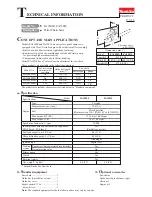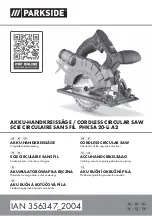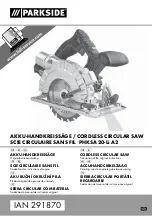
24
GB
Technical Data
Mitresaw
M18 FMS254
Production code
4569 52 03...
...000001 - 999999
No-load speed
4000 min
-1
Battery voltage
18 V
Saw blade dia. x hole dia
254 x 30 mm
Saw blade body thickness max.
Saw blade tooth thickness min.
2 mm
2,8 mm
Cutting width max.
Mitre 0°/ Bevel 0°
Mitre 45°/ Bevel 0°
Mitre 0°/ Bevel 45°
Mitre 45°/ Bevel 45°
91 x 289 mm
91 x 205 mm
51 x 289 mm
51 x 205 mm
Weight according EPTA-Procedure 01/2014 (Li-Ion 5,0 Ah)
20,0 kg
Recommended Ambient Operating Temperature
-18°C ... +50°C
Recommended battery types
M18 B.../M18 HB12
Recommended charger
M12-18 C
M12-18 FC
M12-18 AC
Noise information
Measured values determined according to EN 62841. Typically, the A-weighted noise levels of the tool are:
Sound pressure level (Uncertainty K=3dB(A))
Sound power level (Uncertainty K=3dB(A))
Wear ear protectors!
90,5 db(A)
101,5 db (A)
WARNING Read all safety warnings, instructions,
illustrations and specifications provided with this power tool.
Failure to follow the warnings and instructions may result in electric
shock, fire and/or serious injury.
Save all warnings and instructions for future reference.
MITRE SAW SAFETY WARNINGS
a) Mitre saws are intended to cut wood or wood-like
products, they cannot be used with abrasive cut-off wheels
for cutting ferrous material such as bars, rods, studs, etc.
Abrasive dust causes moving parts such as the lower guard to jam.
Sparks from abrasive cutting will burn the lower guard, the kerf
insert and other plastic parts.
b) Use clamps to support the workpiece whenever possible.
If supporting the workpiece by hand, you must always
keep your hand at least 100 mm from either side of the saw
blade. Do not use this saw to cut pieces that are too small
to be securely clamped or held by hand.
If your hand is placed
too close to the saw blade, there is an increased risk of injury from
blade contact.
c) The workpiece must be stationary and clamped or held
against both the fence and the table. Do not feed the
workpiece into the blade or cut “freehand” in any way.
Unrestrained or moving workpieces could be thrown at high
speeds, causing injury.
d) Push the saw through the workpiece. Do not pull the
saw through the workpiece. To make a cut, raise the saw
head and pull it out over the workpiece without cutting,
start the motor, press the saw head down and push the saw
through the workpiece.
Cutting on the pull stroke is likely to
cause the saw blade to climb on top of the workpiece and violently
throw the blade assembly towards the operator.
e) Never cross your hand over the intended line of cutting
either in front or behind the saw blade.
Supporting the
workpiece “cross handed” i.e. holding the workpiece to the right of
the saw blade with your left hand or vice versa is very dangerous.
f) Do not reach behind the fence with either hand closer
than 100 mm from either side of the saw blade, to remove
wood scraps, or for any other reason while the blade is
spinning.
The proximity of the spinning saw blade to your hand
may not be obvious and you may be seriously injured.
g) Inspect your workpiece before cutting. If the workpiece
is bowed or warped, clamp it with the outside bowed face
toward the fence. Always make certain that there is no gap
between the workpiece, fence and table along the line of
the cut.
Bent or warped workpieces can twist or shift and may
cause binding on the spinning saw blade while cutting. There
should be no nails or foreign objects in the workpiece.
h) Do not use the saw until the table is clear of all tools,
wood scraps, etc., except for the workpiece.
Small debris or
loose pieces of wood or other objects that contact the revolving
blade can be thrown with high speed.
i) Cut only one workpiece at a time.
Stacked multiple workpi-
eces cannot be adequately clamped or braced and may bind on the
blade or shift during cutting.
j) Ensure the mitre saw is mounted or placed on a level,
firm work surface before use.
A level and firm work surface
reduces the risk of the mitre saw becoming unstable.
k) Plan your work. Every time you change the bevel or
mitre angle setting, make sure the adjustable fence is set
correctly to support the workpiece and will not interfere
with the blade or the guarding system.
Without turning
the tool “ON” and with no workpiece on the table, move the saw
English
Summary of Contents for M18 FMS254
Page 5: ...2 I 1 2 ...
Page 7: ...4 II 1 2 1 2 ...
Page 8: ...5 II 1 2 1 2 4 3 1 2 ...
Page 9: ...6 III 1 2 2 1 ...
Page 10: ...7 III 78 100 33 54 55 77 10 32 10 ...
Page 11: ...8 2 1 3 IV 1 2 ...
Page 12: ...9 IV 4 5 EN 847 1 ...
Page 13: ...10 IV 6 1 2 7 2 ...
Page 14: ...11 V 3 45 15 30 30 15 45 60 0 35 3 22 5 31 6 22 5 35 3 31 6 0 45 0 60 4 3 1 2 ...
Page 15: ...12 VI 2 4 3 2 2 1 1 3 ...
Page 16: ...13 VII 1 2 3 ...
Page 17: ...14 VIII 1 2 ...
Page 18: ...15 VIII 3 A 0 30 30 15 45 33 8 15 22 5 22 5 33 8 0 0 30 15 22 5 33 8 33 8 0 45 0 45 3 B 1 2 3 ...
Page 19: ...16 IX 1 2 2 1 1 1 2 1 2 3 A B A AS 2 250 4931 4472 95 B AS 300 500 4931 4472 94 ...
Page 20: ...17 X 1 2 1 2 ...
Page 21: ...18 XI Start Stop 1 2 3 2 1 10 sec ...
Page 22: ...19 XII 1 2 4 3 5 Start Stop ...
Page 23: ...20 XIII 1 89 65 90 89 65 2 3 3 90 00 1x 1x ...
Page 24: ...21 XIII 5 4 6 ...
Page 26: ...23 XIII 1 2 ...
Page 135: ...132 Ara العربية الرموز ...
















































